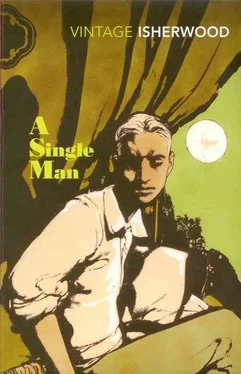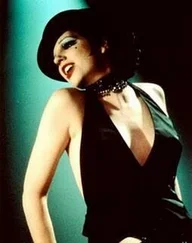Charley comes out of the house as he nears the top. She has been watching for him, as usual, and no doubt fearing some last-moment change in his plans. They meet on the tiny unsafe wooden porch outside the front door, and hug. George feels her soft bulky body pressed against his. Then, abruptly, she releases him with a smart pat on the back – as much as to show him that she isn’t going to overdo the affection; she knows when enough is enough.
‘Come along in with you,’ she says.
Before following her indoors, George casts a glance out over the little valley to the line of boardwalk lamps where the beach begins and the dark unseen ocean. This is a mild windless night, with streaks of sea-fog dimming the lights in the houses below. From this porch, when the fog is really thick, you can’t see the houses at all and the lights are just blurs, and Charlotte’s nest seems marvellously remote from everywhere else in the world.
It is a simple rectangular box; one of those pre-fabs which were put up right after the War. Newspapers enthused over them, they were acclaimed as the homes of the future; but they didn’t catch on. The living-room is floored with tatami, and more than somewhat oriental-gift-shop in decor. A tea-house lantern by the door, wind-bells at the windows, a huge red paper fish-kite pinned to the wall. Two picture-scrolls; a madly Japanese tiger snarling at a swooping (American?) eagle; an immortal sitting under a tree, with half a dozen twenty-foot hairs growing out of his chin. Three low couches littered with gay silk cushions; too tiny for any useful purpose but perfect for throwing at people.
‘I say, I’ve just realised that there’s a most ghastly smell of cooking in here!’ Charlotte exclaims. There certainly is. George answers politely that it’s a delicious smell and that it makes him hungry.
‘I’m trying a new kind of stew, as a matter of fact. I got the idea from a marvellous travel-book Myrna Custer just brought me – about Borneo. Only the author gets slightly vague, so I’ve had to improvise a bit. I mean, he doesn’t come right out and say so, but I have a suspicion that one’s supposed to make it with human flesh. Actually, I’ve used leftovers from a joint —’
She is a lot younger than George – forty-five next birthday – but, already, like him, she is a survivor. She has the survivor’s typical battered doggedness. To judge from photographs, she was adequately pretty, as long as her big grey eyes were combined with soft youthful colouring. Her poor cheeks are swollen and inflamed, now, and her hair, which must once have made a charming blur around her face, is merely untidy. Nevertheless, she hasn’t given up. Her dress shows a grotesque kind of gallantry, ill-advised but endearing; an embroidered peasant blouse in bold colours, red, yellow and violet, with the sleeves rolled up to the elbows; a gipsyish Mexican skirt which looks as if she had girded it on like a blanket, with a silver-studded cowboy belt – it only emphasises her lack of shape. Oh, and if she must wear sandals with bare feet, why won’t she make up her toenails? (Maybe a lingering middle-class Midlands puritanism is in operation here.) Jim once said to her kiddingly, about a similar outfit, ‘I see you’ve adopted our native costume, Charley.’ She laughed, not at all offended, but she didn’t get the point. She hasn’t gotten it yet. This is her idea of informal Californian playwear, and she honestly cannot see that she dresses any differently from Mrs Peabody next door.
‘Have I told you, Geo – no, I’m sure I haven’t; I’ve already made two New Year’s resolutions – only they’re effective immediately. The first is, I’m going to admit that I loathe bourbon.’ (She pronounces it like the dynasty, not the drink.) ‘I’ve been pretending not to, ever since I came to this country – all because Buddy drank it. But, let’s face it, who do I think I’m kidding now ?’ She smiles at George very bravely and brightly, reassuring him that this is not a prelude to an attack of the Buddy-blues; then quickly continues, ‘My other resolution is that I’m going to stop denying that that infuriating accusation is true; Women do mix drinks too strong, damn it! I suppose it’s part of our terrible anxiety to please. . . . So let’s begin the new regime as of now, shall we? You come and mix your own drink and mine too – and I’d like a vodka and tonic, please.’
She has obviously had at least a couple already. Her hands fumble as she lights a cigarette. (The Indonesian ashtray is full, as usual, of lipstick-marked stubs.) Then she leads the way into the kitchen with her curious rolling gait which is nearly a limp, suggesting arthritis and the kind of toughness that goes with it.
‘It was sweet of you to come tonight, Geo.’
He grins suitably, says nothing.
‘You broke your other appointment, didn’t you?’
‘I did not! I told you on the phone – these people cancelled, at the last minute —’
‘Oh, Geo dear, come off it! You know, I sometimes think, about you, whenever you do something really sweet, you’re ashamed of it afterwards! You knew jolly well how badly I needed you tonight, so you broke that appointment. I could tell you were fibbing, the minute you opened your mouth! You and I can’t pull the wool over each other’s eyes – I found that out, long ago. Haven’t you – after all these years?’
‘I certainly should have,’ he agrees, smiling and thinking what an absurd and universally-accepted bit of nonsense it is, that your best friends must necessarily be the ones who best understand you. As if there weren’t far too much understanding in the world already; above all, that understanding between lovers, celebrated in song and story, which is actually such torture that no two of them can bear it without frequent separations or fights. Dear old Charley, he thinks, as he fixes their snorts in her cluttered none-too-clean kitchen, how could I have gotten through these last years without your wonderful lack of perception? How many times, when Jim and I had been quarrelling and came to visit you – sulking, avoiding each other’s eyes, talking to each other only through you – did you somehow bring us together again by the sheer power of your unawareness that anything was wrong?
And now, as George pours the vodka (giving her a light one, to slow her down) and the scotch (giving himself a heavier one, to catch up on) he begins to feel this utterly mysterious unsensational thing – not bliss, not ecstasy, not joy – just plain happiness – das Glueck, le bonheur, la felicidad – they have given it all three genders but one has to admit, however grudgingly, that the Spanish are right, it is usually feminine, that’s to say, woman-created. Charley creates it astonishingly often; this doubtless is something else she isn’t aware of, since she can do it even when she herself is miserable. As for George, his felicidad is sublimely selfish; he can enjoy it unperturbed while Charley is in the midst of Buddy-blues or a Fred-crisis (one is brewing this evening, obviously). However, there are unlucky occasions when you get her blues without your felicidad, and it’s a graveyard bore. But not this evening. This evening he is going to enjoy himself.
Charlotte, meanwhile, has peeked into the oven and then closed its door again, announcing, ‘twenty more minutes’ with the absolute confidence of a great chef, which by God she isn’t.
As they walk back into the living-room with their drinks, she tells him, ‘Fred called me; late last night.’ This is said in her flat underplayed crisis-tone.
‘Oh?’ George manages to sound sufficiently surprised. ‘Where is he now?’
‘Palo Alto.’ Charlotte sits down on the couch under the paper fish, with conscious drama, as though she has said, ‘Siberia’.
Читать дальше












